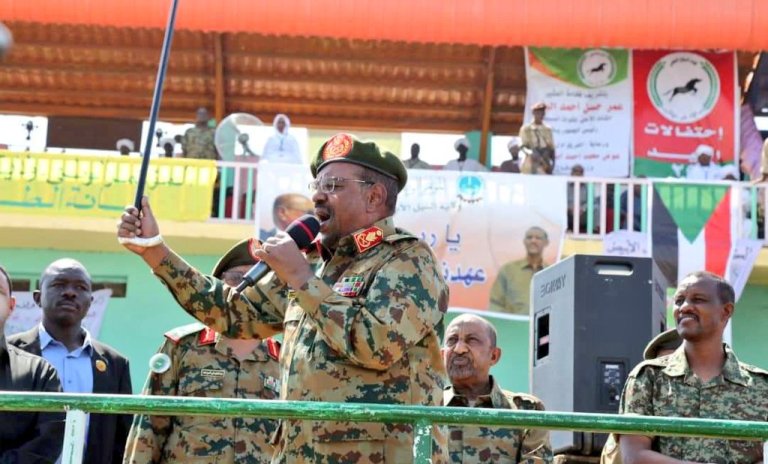Al-Bashir criticizes U.S. policy towards Sudan

November 13, 2018 (KHARTOUM) – The Sudanese President Omer al-Bashir Tuesday has expressed resentment over the United States policy towards Sudan, saying his country wouldn’t link its fate to Washington.
Addressing the 29th anniversary of the establishment of the Popular Defence Forces (PDF) in Kosti, White Nile State, al-Bashir demanded the U.S. to stop any assistance rendered to his country, saying Sudan would “take refuge in Allah [God] alone”.
“We wouldn’t kneel or prostrate to anyone except Allah … Sudan is the most country being targeted and fought against because of its adherence to Sharia [Islamic Law] and independent decision,” he added
He added that Sudan is still strong despite the dire circumstances compared to other nations in the region that have been destroyed by wars and conflicts.
In October 2017, Washington decided the lift of a 20-year embargo on Sudan saying Khartoum has fully cooperated on five key areas of concerns agreed in December 2016.
These areas include the counterterrorism cooperation, the humanitarian access to the conflict areas, Sudan’s support to regional efforts to end the South Sudanese conflict and to fight against the Ugandan rebel Lord Resistance Army. In July 2017, Trump administration added the commitment to the international sanctions on North Korea.
The Sudanese foreign minister El-Dirdeiry Ahmed and U.S. Deputy Secretary of State John Sullivan last week launched the second phase of dialogue between the two countries in Washington.
The two sides agreed on a new plan for the normalization of bilateral relations and removal of the east African nations from the list of state sponsors of terrorism.
SECOND PHASE OF SUDANESE-AMERICAN DIALOGUE
Meanwhile, the U.S, Charge d’Affaires in Khartoum, Steven Koutsis on Tuesday held a news conference on the second phase of dialogue between Sudan and the U.S.
According to a press release from the U.S. embassy on Tuesday, Koutsis said: “the completion of the Five-Track Engagement Plan and the lifting of certain sanctions in October 2017 marked an important milestone in U.S.-Sudanese relations”.
“However, our progress thus far serves as only the first step in a long road to improving bilateral relations,” he said.
“We have therefore launched the “Phase II” framework for our bilateral engagement, which is designed to expand our cooperation, facilitate meaningful reforms in Sudan, and achieve further progress in a number of areas of longstanding mutual concern,” added the U.S envoy.
He pointed out that the second phase “has the potential to make the U.S.-Sudan relationship more productive than it has been in 30 years”, saying Washington “remains committed to positive engagement with Sudan and to achieving our shared goals on the basis of mutual understanding and respect”.
According to Koutsis, the shared second phase priorities between the two sides include expanding counter-terrorism cooperation, enhancing human rights protections and practices, improving humanitarian access throughout Sudan, ceasing internal hostilities to create a conducive environment for progress in Sudan’s peace process, taking necessary steps to address certain outstanding terrorism-related claims and adhering to UN Security Council resolutions related to North Korea.
“As part of this engagement, the United States is prepared to initiate the process of rescinding Sudan’s designation as a State Sponsor of Terrorism — if the determination is made that all of the relevant statutory criteria have been met, and if Sudan makes progress in addressing each of the six key areas of mutual concern prioritized by the Phase II framework,” he pointed out.
In November 2017 during a visit that Sullivan conducted to Khartoum, the two countries agreed to exchange written notes on the process before to meet for a better understanding.
During this year 2018, several American officials visited Sudan to discuss relations with North Korea, as a UN report unveiled contacts between Pyongyang and Khartoum.
In its report to the Security Council on 5 March 2018, a panel of UN experts on Security Council sanctions against North Korea reported suspected activities of North Korean nationals in Sudan in 2016 and 2017.
Recently, the Sudanese security and intelligence services blamed the local press for reporting the arrest of fake North Korean doctors in Khartoum saying there was no need to mention their nationality.
In the past, Khartoum informed Washington they had expelled all the North Korean nationals from the country.
(ST)
